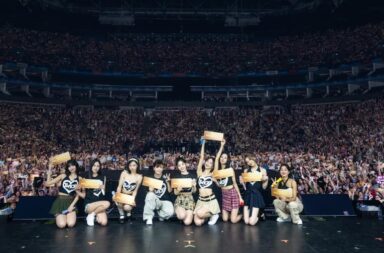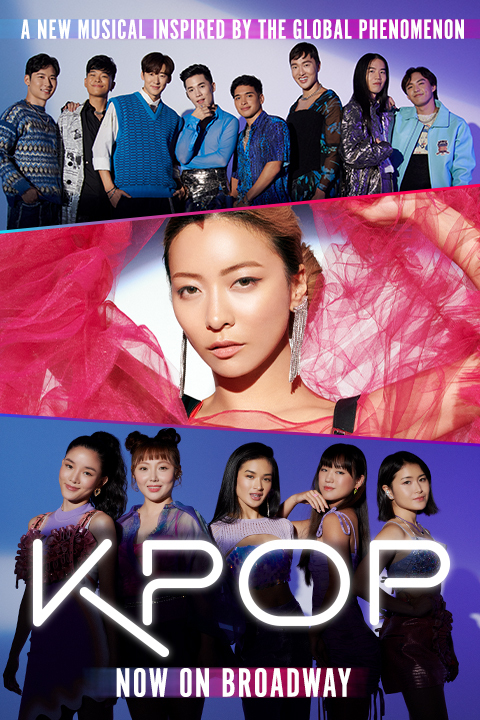
K-pop takes Broadway by storm with a soaring tale tackling ageism in the cycle of the industry. In addition, K-pop Broadway highlights the amazing choreography that it has become known for, with songs tied into the character arcs. The show makes use of its cast–one divided by boy group, girl group, and a soloist superstar– superbly to underline these intricate themes with surprising depth, giving the audience not just a show but food for thought. Throughout the two and a half hour show, it questions the audience: why must women be “replaced” with younger stars once they reach a specific age? Why is it difficult for Americans to accept Asian performers?
Oh wait. That was off-Broadway.
At Broadway, we got a completely different version of the story, one that makes K-pop Broadway the latest in the overall trend where off-Broadway shows are watered down in an attempt to appeal to the traditional Broadway going audience.
Let’s backtrack.
The road to the Great White Way takes years. Shows will debut off-Broadway then take it to Broadway, with several even debuting in London’s West End as a test run to appeal to financial benefactors, to show further proof of concept essentially. Somewhere along the way, criticism and comments are incorporated into the off-Broadway product. Setting and stage designs are changed, plots and sub-plots are added/dropped, and character arcs evolve. Usually though, they are for the better.
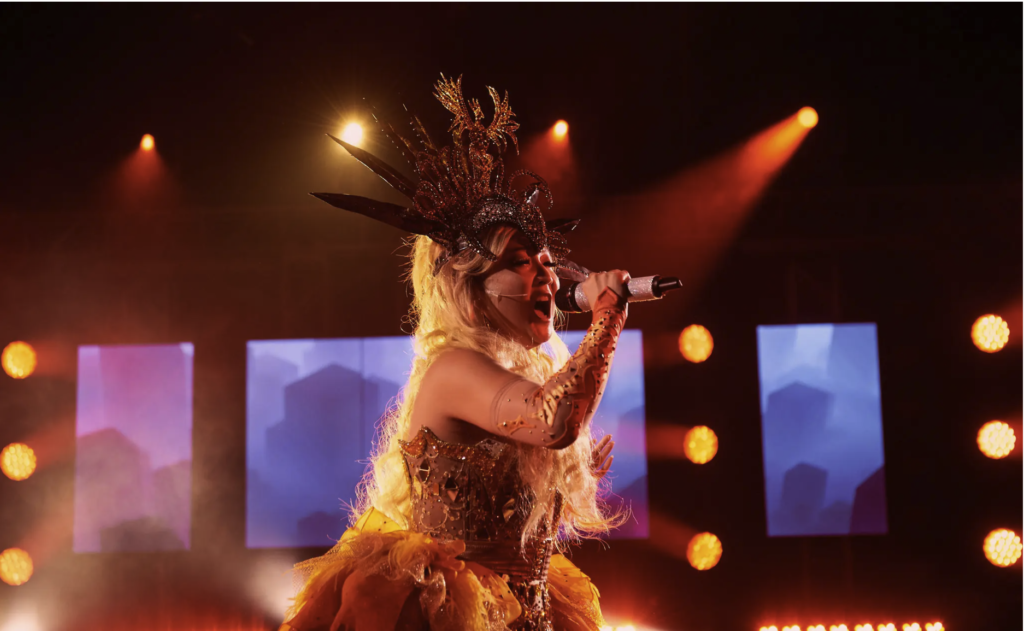
An example of this is the popular Hadestown. The off-Broadway version premiered in Vermont in 2006 and featured a cast drawn from local artists. It had a more DIY approach in terms of its costumes and stage design, with heavy themes of economic hardship and class politics. As the show made its way to Broadway, it kept these themes and added in an element of climate change. It debuted in 2019 to critical acclaim, especially for keeping its socio-economic critique.
In the case of K-pop Broadway, their route to Broadway was relatively straightforward. They opened off-Broadway in Ars Nova in New York City in September 2017. It has a book written by Jason Kim, and the music and lyrics are by Helen Park and Max Vernon. The off-Broadway show was widely acclaimed by critics, who praised the story for its challenging themes and cast for their performance. In 2018, it received the Lucille Lortel Award for Outstanding Musical, an honor that has also been bestowed to Hamilton in 2015, and In the Heights and Spring Awakening in 2007.
Following several delays, it premiered on Broadway at the Circle in the Square Theater in October for previews. While it was due to debut on November 20, it was delayed due to several in the cast having tested positive for Covid. In addition to buying tickets through the official box office, you can also apply for the lottery or get rush tickets (which is what I did), and details are on their web page.
The Broadway cast is filled with many new faces, but anchored with some we know well. Luna of f(x) fame is MwE, our main character, with miss A‘s Min and Spica‘s Bohyung being part of the fictional girl group, RTMIS. U-Kiss‘ Kevin Woo is the leader of the fictional boy group, F8.
The easiest way to summarize the story is through grouping it by MwE’s story, F8’s story, and that of RTMIS. MwE is having a crisis of self. Because she has been pushed to be perfect since she was discovered at 9, she no longer wants to be told to sing songs that mean nothing to her. Her arc revolves around standing up for herself and her dreams, with a big emotional ballad that she wrote. There’s also a sub-plot about her having a secret boyfriend, which is supposed to tie in to the parasocial relationship that K-pop fans can have with their idols. But there isn’t much done with this sub-plot, and might even be the weakest part of the show.
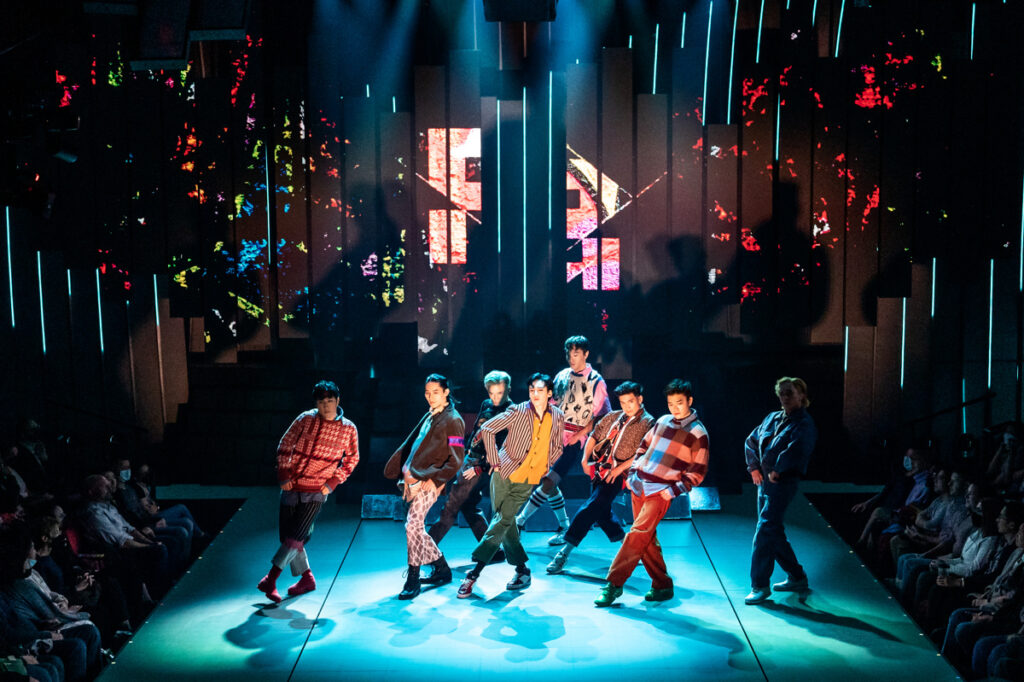
F8, on the other hand, have a situation where one of the members was added in the last minute, and is neither full Korean, nor speaks Korean. This is a common enough scenario in K-pop, so there is nothing too weird about it from the perspective of an audience member. What makes it a Thing is that the documentary director–and I do wonder if they’ll keep him white every time–wants to create tension to make them seem human. And the director’s solution to this is by highlighting only the half-Korean member, creating drama through pointed Q&As filmed like a reality show.
But, as the show highlights, being Korean isn’t some factory setting that is standard throughout. As the other F8 members emphasize, several of them may be full-blooded Korean, but they don’t speak the language and weren’t born in Korea either. So to criticize Brad for it would be hypocritical.
As for RTMIS, well, they barely have a story. In fact. their introductions were even interrupted by the documentary director so that he could start drama. Unfortunately for him, nothing like that happens. For RTMIS are about to debut and are afraid of saying the wrong thing.
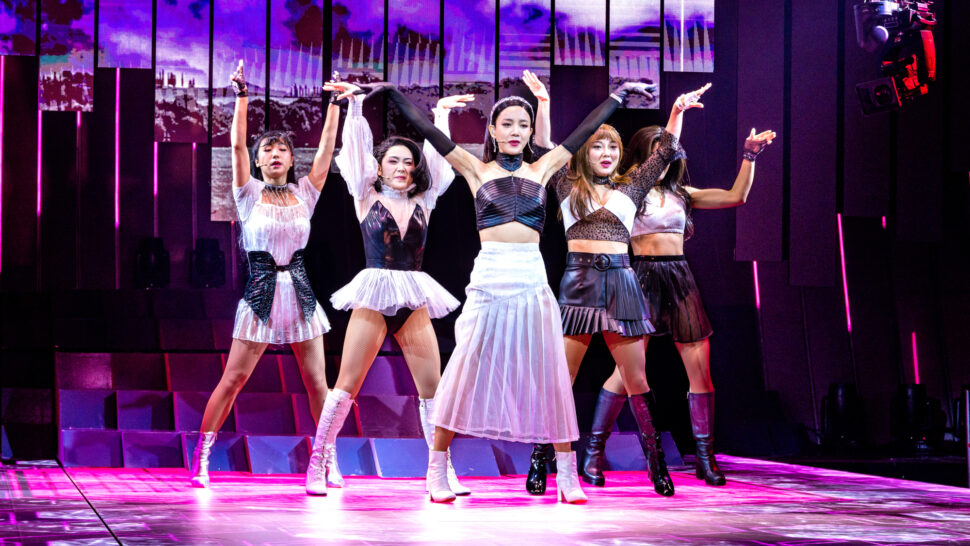
That’s it. That’s their story, and they don’t even have any scene of weight until late into act two. To be brutally honest, it seemed like they were there so that F8 or MwE could change costumes.
There’s a bit more to it–the director of the documentary failed to launch as a “serious” film maker, the CEO of RBY Entertainment failed to become a star in America and was criticized in Korea–but this is meat of the story. There’s no nuance, really, and it is shoved in between dated songs that don’t make sense to the story.
The grand finale is treated like the actual show they had been preparing for. RTMIS gets to debut, F8 gets to comeback with their new song, and Luna shows up with a showstopper. During the final song, they all come together in a company song that is reminiscent of old K-pop. It ends on a high note and while there was no real story, I won’t hide the fact that I loved being able to see Luna in person.
That being said, this is so different from the off-Broadway version. Gone are the themes of ageism in K-pop and the question of why Americans find it hard to accept Koreans. Instead, we hone in on a singular theme from Off-Broadway: the expectation of perfectionism. However, this isn’t fleshed out… mostly since it was the storyline RTMIS had off-Broadway.
A devastating blow during the move to Broadway was eliminating the ageism storyline. In the original, MwE is more hardened and skeptical of the move to America, with MwE being more opinionated. Instead, Luna’s MwE is more like a debut artist who hardly stands up for herself. Furthermore, Sonoma from RTMIS was being trained to replace MwE, echoing how K-pop companies usually start to replace their female artists once they reach the end of their first contract.

There are plenty of great things about the show. They make use of the stage design and lighting well, truly making it feel both intimate and like a show with a flip of a switch. The set-up works well for the meta-story telling, and I can see them being nominated for their stage design.
The meta-storytelling design is also one that I adored, as it made use of the audience. The set up is simple and established from the start: the audience of the show are also the audience of stage show, where we will see RBY Entertainment bring three of their idols into America.
Despite the technical strengths, I found the script to be their downfall. There is more telling than showing, even more than the average Broadway show. Character backstory is shoved in through monologue, and for the girls of RTMIS, there wasn’t even any story. I’d say that the cameraman, who had minimal lines, had more of an arc than the girls.
The age of the the off-Broadway show is also obvious with songs that were dated. One could also see immediately which acts inspired what, with some in the audience even going “this is so EXO!” at one song. While it could be said that this is a highlight, I do wonder how this will survive even more than a year or two.
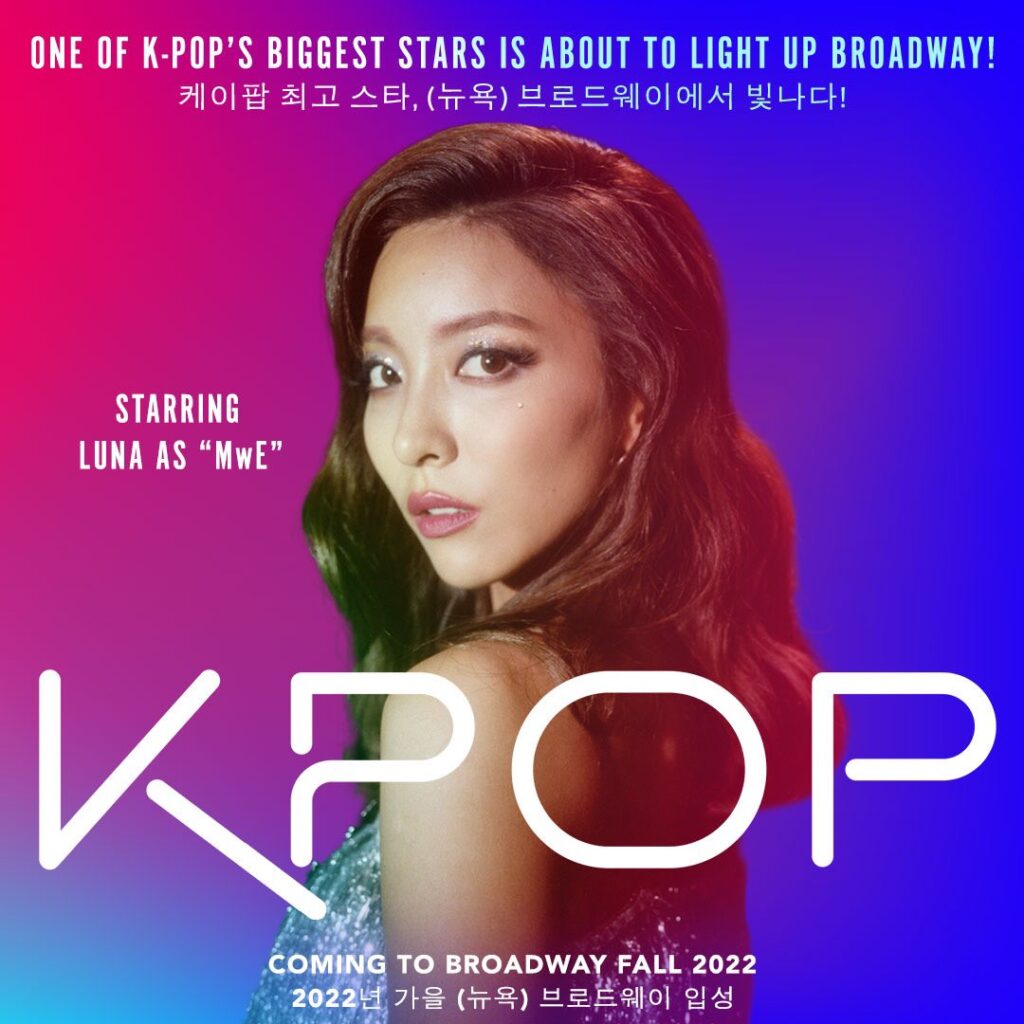
I also wonder how the show will do after Luna leaves. Because so much relies on the audience to be attached to her–and they are clearly using touch stones from her career in f(x). MwE starts training at 9, debuts at around 15, echoing Luna’s career. Her character is now 29, the age of Luna herself. They criticize younger, about-to-debut Luna for having tree-trunk thighs, which is something that was said to Luna during the first couple of years post-debut. Another that is clearly taken from Luna is how MwE is “all technique but not human enough.”
So, will the show survive Luna leaving and being replaced by someone else? Or will they hire another K-pop star for her role? Because without the appeal of seeing a K-pop star on stage, there isn’t anything worth seeing in the show.
Don’t get me wrong, K-pop Broadway a fun time. But when it comes to Broadway, it isn’t just songs. It’s also stories. This isn’t a concert, it’s a musical. If you are looking for a fun concert and to see Luna (or one of the other K-pop stars), then it’s great. But if you’re looking for something more–with depth and character arcs–then this might not be the show for you.
YouTube [1][2] Images via Matthew Murphy for K-pop Broadway, Broadway.com, Playbill

